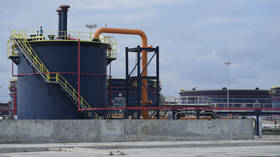Nigeria takes step to combat fuel shortages

Nigeria will commission its new Dangote Petroleum Refinery on Monday in hope of alleviating the chronic fuel shortages that have turned Africa’s biggest oil producer into a fuel importer.
The processing plant, which has capacity of 650,000 barrels per day, is expected to cover all of the country’s fuel demand, according to Nigerian media.
Built by Dangote Group, a conglomerate owned by billionaire industrialist and Africa’s richest man Aliko Dangote, at the Lekki free trade zone near the city of Lagos, the refinery is being touted as a way to end the country’s reliance on imports for nearly all of its refined petroleum products.
The giant complex is one of Nigeria’s single largest investments. It comprises a 435-megawatt power station, a deep seaport and a fertilizer unit. Initially, $12 billion was earmarked to build the refinery, but the project ended up costing $19 billion after years of delay.
Crude processing is scheduled to begin in June, although the research consultancy firm Energy Aspects said that commissioning was an intricate process and that the facility may only start operating later this year. It is expected to reach about 50-70% of processing capacity next year and full capacity by 2025.
The refinery will produce Euro-V quality gasoline and diesel, as well as jet fuel and polypropylene, the company said, adding that the facility was “designed to process a large variety of crudes including many of the African crudes, some of the Middle Eastern crudes and the US Light Tight Oil.”
Despite being Africa’s biggest oil producer, Nigeria imports petrol, diesel, and processed petroleum products because many of its own refineries have dilapidated over the years.
Dangote expects the new plant to cover Nigeria’s domestic fuel needs and produce extra volumes for export. It is also expected to boost the market for Nigerian crude to $21 billion per year, the company added.
The Nigerian National Petroleum Corporation has a contract with Dangote to supply some 300,000 barrels of crude per day. However, theft, pipeline vandalism, and underinvestment poses a threat to achieving full output, economist Kelvin Emmanuel told Reuters.
In April, Nigerian oil production slumped under 1 million bpd, below Angola’s output, data showed.
According to Emmanuel, Dangote might be importing oil from international trading companies such as Trifigura and Vitol, as the refinery has not yet signed agreements with oil majors in Nigeria.
Meanwhile, Energy Aspects expects the Dangote refinery to not only solve Nigeria’s fuel shortages but also to reshape the gasoline market in the Atlantic basin.
For more stories on economy & finance visit RT's business section













